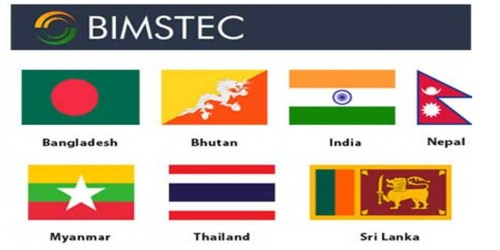BIMSTEC
The Bay of Bengal Initiative for Multi-Sectoral Technical and Economic Cooperation, (BIMSTEC) is a regional organization comprising seven Member States lying in the littoral and adjacent areas of the Bay of Bengal constituting a contiguous regional unity. This sub-regional organization came into being on 6 June 1997 through the Bangkok Declaration. It constitutes seven Member States: five deriving from South Asia, including Bangladesh, Bhutan, India, Nepal, Sri Lanka, and two from Southeast Asia, including Myanmar and Thailand. The permanent secretariat is situated at Dhaka, Bangladesh. It was established in September 2014. The present chair is Sri Lanka.
The objective of BIMSTEC is to harness shared and accelerated growth through mutual cooperation. It started with co-operation in six sectors -including trade, technology, energy, transport, tourism, and fisheries.
Objectives of BIMSTEC:
The main objective of building such an alliance was to harness shared and accelerated growth through mutual cooperation in different areas of common interests by mitigating the onslaught of globalization and by utilizing regional resources and geographical advantages.
- To create an enabling environment for rapid economic development through identification and implementation of specific cooperation projects in the sectors of trade, investment and industry, technology, human resource development, tourism, agriculture, energy; and infrastructure and transportation.
- To accelerate the economic growth and social progress in the sub-region through joint endeavors in a spirit of equality and partnership.
- To promote active collaboration and mutual assistance on matters of common interest in the economic, social, technical and scientific fields.
- To provide assistance to each other in the form of training and research facilities in the educational, professional and technical spheres.
- To cooperate more effectively in joint efforts those are supportive of and complementary to national development plans of the Member States which result in tangible benefits to the people in raising their living standards, including generating employment and improving transportation and communication infrastructure.
- To maintain close and beneficial cooperation with existing international and regional organizations with similar aims and purposes.
- To cooperate in projects that can be dealt with most productively on a sub-regional basis and make the best use of available synergies among BIMSTEC member countries.
















